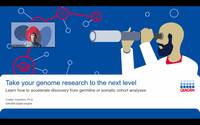QCI I Translational
From Variants to Vision: Driving Oncology Breakthroughs in Translational Research
116 views
Aptly called "bench-to-bedside", translational research involves developing and testing new techniques and therapies for better disease management and patient care. This field plays a pivotal role in ensuring that discoveries realize their potential for real-world impact instead of staying confined to the lab.
Join us in exploring how two tools can accelerate translational cancer research. Human Somatic Mutation Database (HSMD) Professional is an expert-curated somatic knowledgebase that incorporates real-world cancer patient data, while QCI Interpret Translational (QCI-IT) is a variant annotation and interpretation tool that provides automated ACMG/AMP classification, phenotype-specific insights and more.
You’ll learn how:
• HSMD, which includes data from over 870K real-world oncology cases, provides easily accessible and reliable data for the identification of clinically significant and actionable mutations
• QCI-IT can process uploaded variant data to prioritize impacting symptoms, pathways and genes implicated in drug response or disease progression
• HSMD and QCI-IT can be used in tandem to efficiently transition from exploratory insights to actionable decisions
Related videos
QIAGEN CLC Genomics
Investigating genomic variants using QIAGEN CLC Genomics Workbench, QCI Interpret-Translational...
Discovering new genes implicated in hereditary diseases or cancer progression...
QCI I Translational
Take your genome research to the next level with QCI Interpret Translational
Discovery of new genes implicated in hereditary diseases or cancer...
Gene Variant Databases
Germline and Somatic Variant Investigation using COSMIC, HGMD and QCI-IT
The accurate identification and annotation of germline and somatic variants...



